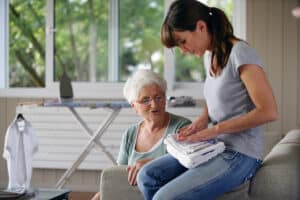If your loved one is scheduled to have a hysterectomy, especially an abdominal hysterectomy where they remove the uterus by opening up the abdominal walls, you can expect she’s going to need some care and assistance when she first returns home. Recovery is usually fairly non-problematic, but returning home after a few days in the hospital can present challenges, especially if your elderly loved one lives alone. This is why hiring a hospital to home transition provider would help with their recovery care.
At-Home Recovery Guidelines for Hysterectomies

While there aren’t a lot of rules to follow once your loved one returns home from her hysterectomy, the rules, and guidelines she has been given should be adhered to help the healing process go smoothly and without any undue complications. For a senior who’s used to doing most things on her own, simply resting is going to be the toughest part of her healing. Having someone there to assist with the hospital to home transition can provide her with the support she needs so she’ll feel more comfortable resting without the worry of things not getting done.
Your loved one will be instructed to not lift anything more than 3 pounds for several weeks so that can make some much-needed actions around the home more difficult as well. Let’s look at some ways having assistance during that hospital to home transition can step in and help with those more strenuous chores around the home.
Tasks a Hospital to Home Transition Provider Can Assist With
Laundry. If your loved one’s washer and dryer are on a different level, she will need help carrying loads of laundry. Even if the laundry is on the same level, if it’s a top loader, she’ll need assistance with reaching in and lifting the clothes out.
Meals. While many meals don’t require a lot of physical exertion, if your loved one is trying to pour a gallon of milk, reach for appliances on high shelves, or even take the garbage out afterward, it might be hard on her surgical site for several days or weeks. Having someone at home to help with this part of the hospital to home transition can ensure she still eats well while she’s recovering.
Pet Care. If your loved one has a dog that needs to be walked or a cat that needs its kitty litter changed, she will need help with both of these during recovery. While your loved one might be able to walk along with you on the dog walks, if her dog is known for pulling on the leash, having someone else hold the leash will prevent her from injuring her incision area. She should also have assistance for lifting anything heavy like large bags of dog food or kitty litter.
Outdoor Care. Depending on the season, your loved one might need help mowing the lawn, raking leaves, or shoveling snow. All of which should be avoided for several weeks after surgery. Having a neighbor step in to help with these chores is great if that’s an option. If not, hiring a professional who helps with that transition time can assure that your loved one will have help when and if she needs it.
Personal Care. Your loved one may need help with bathing, taking care of her incision area, or following the doctor’s orders for exercise. Having a professional there to help with that hospital to home transition time can ensure she gets the support and encouragement she needs.
If you or an aging loved one are considering Hospital to Home Transition Services in Tamarac FL, please get in touch with the caring staff at Star Multi Care today. Call 954-962-0926
Star Multi Care is a Trusted Home Care Agency in Florida including Palm Beach, Miami Dade, and Broward County.
- Helping Seniors Embrace Support - April 24, 2025
- In-Home Cancer Rehabilitation Can Provide Many Benefits - April 16, 2025
- Necessary Steps Caregivers Should Take To Care For Themselves - April 9, 2025

